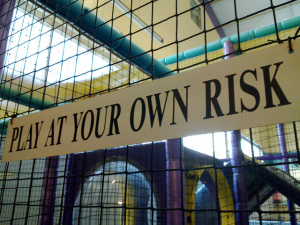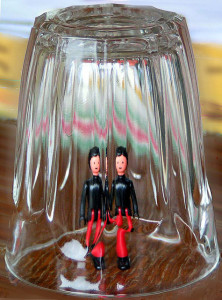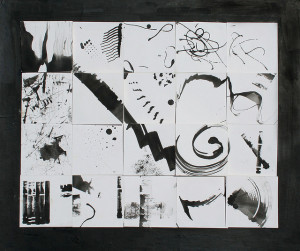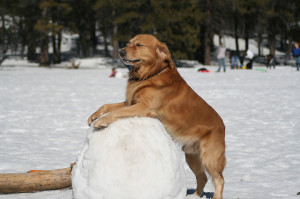This post continues with Week 5 in a series of posts on topics that relate to writer’s residencies (info on my own residency is in the sidebar to the right). I started at Week 1: Preparing, and am counting up. See also Week 2: Make Writing Exercises Work for You, Week 3: In Defense of Obstinacy, and Week 4: A good prompt is hard to find.

Procrastinators, beware! Writing exercises are risky business. CC image “Play at Your Own Risk” via Stephen Gadsby on Flickr. Some rights reserved.
In science, you never ever call an experiment before all the results are in: not before you’ve concluded all the tests, counted and analyzed all the samples, and run the numbers through statistical software, after first reviewing any shortcomings in your method.
Likewise, you don’t “call” the end of a sports match before it’s over. We know too many stories of last-minute comebacks, of end-of-game collapses, to truly know what the results will be until after the clock has run down to zero.
However, I feel reasonably confident in making a few comments about the past four weeks of my experiment with writing exercises, although technically speaking, as I’m writing this, I am still in the midst of my fourth week. If I was a scientist, perhaps I would call these preliminary results, but I’m not a scientist. I’m a touchy-feely liberal artist, and the trend seems clear.
Writing exercises are sneaky bastards, and you should use them at your own risk.
Sneaky bastards
In ways both good and bad, writing exercises are deceitful little creatures, posing as one thing, though often showing up as another. For one, they are deceptively difficult to practice. Exercises are intentionally short and focused: write for five minutes. Write three paragraphs about your favorite breakfast cereal. In my case, write no more than 500 words, keeping your novel in mind. However, despite their brevity, I found myself often ducking the exercise, postponing when in the day I would write, and sometimes forgetting to write altogether.
My average was three exercises a week out of a five-day “work week” of Mondays through Fridays. Most of the time, I sat down to my legal notepad (I avoided working on the computer, because of fear of distraction) with a mental groan. Except in Week 4, where I am just shy of perfect and have experienced much less reluctance to take on the exercise, all week.
For another, writing exercises also pretend that they are simple creatures, with low standards for happiness and without ambition. Be warned, this is a lie. Like David up against Goliath, they pack a lot of punch and savvy for their small size. I found myself, in the latter half of the experiment, running up against my time and word constraint and ending the exercise before I ended the scene.
Despite all my best intentions to keep them hypothetical, they kept advancing my plot. Nasty, double-talking exercises!
Procrastinators, beware
Somewhere at the start of the third week, I had to concede that my writing exercises weren’t exercises anymore. They were still experimental, but they had shape-shifted, and now were scenes and fragments of scenes, important linkages in narrative, subtle lights on the motivations of a few key characters. I tried to call them exercises through Week 3, but I finally had to give up. I was writing. I was writing my novel.
Be warned: if you want to procrastinate, writing exercises are NOT for you.
If you don’t feel like working on your story project, writing exercises are NOT for you.
If you prefer to not learn something new (not always pleasant) about yourself or your characters or your writing habits, WRITING EXERCISES ARE NOT FOR YOU.
In conclusion
In conclusion, writing exercises can lead to writing.
I started the exercises four weeks ago as a way to stay in touch with my writing muscle while I did research for my writer’s residency. I projected that I’d be spending so much time looking up information, I would be in danger of losing touch with my story and my characters. In this sense, the experiment has been a success, because my characters and I are now VERY close.
In terms of providing a writing stopgap until proper writing could take place, this writing exercise experiment has been a FAILURE.
I have a writing habit now, and a minimalist but persistent word count I want to meet. My writing exercises ended up developing my story. I’ve done more writing on my novel since starting the exercises as a way to postpone working on my novel, than I had in the months before I started exercises. Stopgap, my foot.
Disclaimers: Due to the small sample size (N=1) and the abbreviated duration of this experiment, results cannot be definitively extrapolated to other members of the writing population. The prospective nature of this study makes statistical analysis tricky. However, my results show that writing exercises may in fact lead to a writing habit, and have demonstrated amplifying effects on story ideas in certain cases. Proceed at your own risk.




